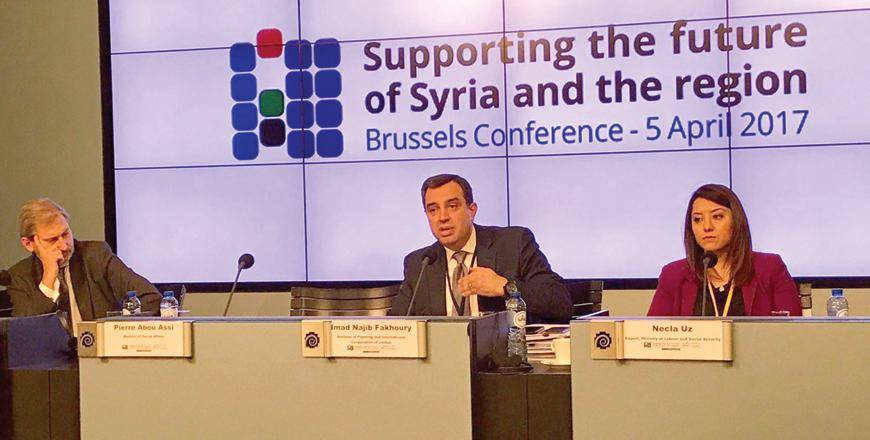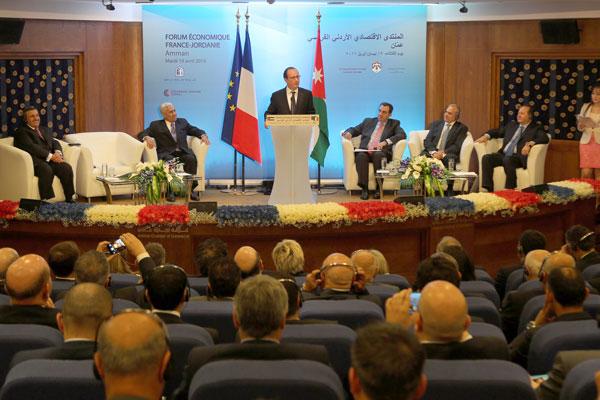You are here
Jordan secures $1.7b grants, grant equivalents at London conference
By JT - Feb 04,2016 - Last updated at Feb 04,2016
AMMAN — Jordan on Thursday secured around $1.7 billion in grants and grant equivalents for its Syrian refugee response plan for this year and the coming two years.
According to the Jordan Compact, a statement issued by Jordanian stakeholders involved in the London donor conference, published by the Jordan News Agency, Petra, on Thursday, pledges made in London amount to around $700 million of grants in support of the Jordan Response Plan for 2016, the majority for priorities outlined in the resilience component of the plan targeting host communities.
“Additional pledges already made will contribute to the aim of providing around $700 million in grants for 2017 and 2018 too. Donors will support job creation programmes such as P4P for Syrian refugees and host communities,” the document said.
More pledges of around $300 million of grant or grant equivalents have already been made. More is expected, according to the compact document.
Meanwhile, multilateral development banks have identified the potential to increase their financing from $800 million to $1.9 billion. It will be important that this funding is provided on as concessional terms as possible.
The document said that the international community commits to continuing to work with Jordan in the years ahead to manage any remaining financing gaps.
The Jordan Response Plan sets Jordan’s needs to maintain its resilience in dealing with the refugee crisis at around $8 billion for the years 2016-2018.
Titled “Jordan Compact: A New Holistic Approach between the Hashemite Kingdom of Jordan and the International Community to Deal with the Syrian Refugee Crisis”, the document said the new approach is anchored on three interlinked pillars, to support Jordan’s growth agenda whilst maintaining its resilience and economic stability:
Turning the Syrian refugee crisis into a development opportunity that attracts new investments and opens up the EU market with simplified rules of origin, creating jobs for Jordanians and Syrian refugees whilst supporting the post-conflict Syrian economy;
Rebuilding Jordanian host communities by adequately financing through grants the Jordan Response Plan 2016-2018, in particular the resilience of host communities; and
Mobilising sufficient grants and concessionary financing to support the macroeconomic framework and address Jordan’s financing needs over the next three years, as part of Jordan entering into a new Extended Fund Facility programme with the IMF.
“The government of Jordan is committed to improving the business and investment environment and is taking forward a detailed plan on what measures, changes to regulation, structural reforms and incentives can be offered to domestic and international businesses. The aim is to produce this by the summer with technical assistance provided by key donors and the World Bank/IMF. The government has followed IMF advice on sound macroeconomic and fiscal management, and will embark on a new programme with the IMF (Extended Fund Facility) as a continuation to its fiscal adjustment and structural reforms that are also in line with the Jordan 2025 Vision,” it said.
The document stated that an integral part of incentives to businesses is access to European markets under easier terms than those currently available.
It outlines a government plan to create jobs for Jordanians and Syrians.
“The government intends, as a pilot, to designate five development zones and provide these with maximum incentives under the new investment law. These have the potential to provide additional jobs for Jordanians and Syrian refugees. In addition to the existing preferential access for Jordan’s products into the EU market, such as zero tariffs, and no quotas for most traded goods, the EU will accelerate plans to revise preferential rules of origin with a view to an outcome by summer 2016 at the latest. The more generous the access to EU markets, the greater number of jobs likely to be created. Changes to preferential access to the US market provided a transformative export boost.”
In the outcome, and with “the right investment and access to EU markets, the designated development zones could provide hundreds of thousands of jobs for Jordanians and Syrian refugees over the coming years. Outside the zones, the sectors where there is low Jordanian participation and a high ratio of foreign workers (e.g. construction, agriculture, service industry, cleaning) and where there is a high degree of skills match (e.g. handicrafts, textiles), could provide roughly 50,000 job opportunities for Syrian refugees over the next year. Cumulatively these measures could in the coming years provide about 200,000 job opportunities for Syrian refugees while they remain in the country, contributing to the Jordanian economy without competing with Jordanians for jobs”.
The conference of donor nations raised $11 billion for Syrian humanitarian needs over the next four years, British Prime Minister David Cameron said on Thursday as the event in London drew to a close, Reuters reported.
Cameron told a news conference that donors had pledged $6 billion for this year alone, and a further $5 billion to be spent by 2020.
Related Articles
AMMAN — The Brussels conference on Syria has approved aid worth $39,7 billion, including six grants, for Syrian refugees' host countries inc
AMMAN – French President François Hollande on Tuesday said he wanted to see his country among the top three investors in Jordan in the futur
AMMAN — Germany has provided over 100 million euros (around JD80.5 million) to Jordan to help the Kingdom turn the influx of Syrian refugees













